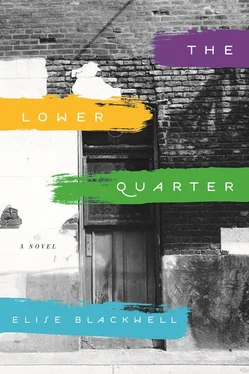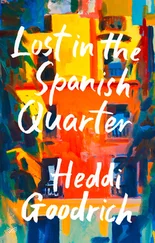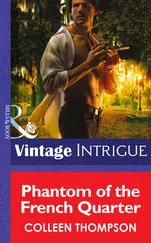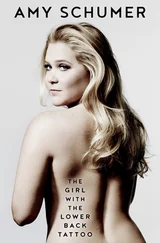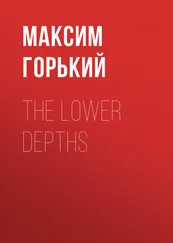“Once in college I brought a guy home,” she told Eddie, “and he said this was the most boring place he’d ever been to.”
“Then he was an idiot,” Eddie said. “For one thing, no place is boring, least of all this one.”
“Now this place is just gone.”
They parked in the new casino’s half-full lot and walked along the beach, which had been cleaned to immaculate for maybe half a mile.
“What about where you’re from, what’s interesting about it? What about your family?” Marion asked as they took sand-slowed steps.
“As for my family — not boring. That I can say. I got a dealt a raw hand there, and part of that meant living in a lot of different places. But at a certain age, you’re responsible for yourself, and maybe you get to pick your own family. That’s why I came to New Orleans. Seemed to me like a place that’s starting over is a good place to start yourself over. What I mean isn’t just that it’s easier or puts you in a lot of company but that it makes you part of something bigger than yourself, so it’s not just about you. Intentional community, or something.”
“I read somewhere that New Orleans used to be called the accidental city.”
“Some people make the most of bad happenstance.”
The line was obvious and nearly straight: fine, pale sand on one side and rubbish tangled in kelp on the other, as far as they could see. Here and there a gull sat atop a heap, a pelican on a precariously perched toilet seat or window unit. It was like the opposite of a still life, with the animals representing not decay but life and the inanimate representing not the static but the transitory, the destructive passage of time. She felt like she had found it: a way to start painting about New Orleans that was new. It surprised her that she looked forward to the work itself rather than to anywhere it might lead in life, which was probably nowhere.
And maybe the art growing across her back would inspire what she put to canvas. She imagined herself alone in a room, painting something darker and more stylized than she had done before. She saw a long, multicolored alligator swimming in brown water, dark, jagged birds making the sky over the river near her house marvelous with their terrible numbers. She would need a large canvas for that.
She startled when she noticed Eddie staring at her.
“This is a date, right?” he asked, his voice muted by the soft wind coming off the water.
“Not exactly dinner and a movie,” Marion said, but she let him move in to kiss her.
The Pontiac overheated when they were almost back to Slidell. As Marion sat in the car with Eddie hidden behind the opened hood, she felt happy — actually happy for the first time that she could remember.
Clay
Clay assumed that his first encounter — the first of the two deaths — would be difficult and the second easy, but they were reversed. The man he met in Luxembourg was both fastidious and nervous despite his thuggish appearance. He was particular about the wire transfer, the details of what was more or less a last will and testament, the preparations for the death itself.
“It must be a suicide and not a homicide — not even an assisted suicide,” the man instructed in perfect but heavily accented English. “This is not The Netherlands.”
Clay smirked, not quite sure if the added bit was an attempt at levity or not.
“But it is crucial that you proceed correctly so as not to damage the material.” He nodded, perhaps confirming that they both knew material was one hell of a euphemism. “We make beautiful products, and this situation, while out of the ordinary, will be no exception. I’m sure that’s the way you want it.”
As he nodded his agreement, Clay imagined Johanna’s long fingers, her short, clean nails.
There were papers to get to his publisher and addresses to verify: Johanna’s, of course, and his father’s, and Marion’s. He had not forgotten about dear Marion. Because he knew Johanna would not touch his money, would feel besmirched by it and angry to have it presented to her, Marion was going to be a very wealthy young woman. It fitted their relationship, which, after all, had begun as a monetary exchange.
Maybe she would do some good with the money — Clay sensed in her an unrecognized affection for New Orleans and, he assumed, for wounded things of various kinds — or maybe she’d blow it on tattoos and Jell-O shots and absurd jewelry. He really didn’t care. The point of giving her the money was letting her do with it whatever she wanted.
It all took several days more than expected, so he was glad he had told Marion to hang on to the painting for a full two weeks. Even though Johanna was no longer in danger, it felt right that the whole affair be settled in its details and then completed posthumously.
He assumed it would be her face he saw as his vision darkened and permanent sleep seeped slowly in, but he knew that the last face he imagined might well belong to the second defendant whose death he had made literal.
Everything in Belgium had gone as planned, as he had imagined it on the plane, right down to the ready rental car with its accurate navigation system. The bachelor had even answered his own door, a door his ancestors had walked freely in and out of for several hundred years. He wasn’t imposing, nor was he a once-strong man declined to old and frail. Perhaps because he had watched too many movies in his life, these were the two alternatives Clay expected. Instead he was very nearly ordinary, though a first impression of kindliness cleared quickly to an obvious smallness evident in the overly tidy haircut. A puniness of character or mind or self — Clay didn’t worry about the terminology for the thing that a person is, the thing he intended to take from this man and render nonexistent.
“Monsieur Fontenot the Younger, I assume?” Even his voice was smaller than it should have been, the words pinched off, leaving too much space between them.
His eyes, though, while small were deep. They were dark and mean, and Clay wanted to cut them out of his face.
Clay nodded in response to the man’s question and just that easily entered the mansion with the architect’s bag containing an unpainted canvas and a recently acquired hunting knife.
Eli
He stood, and Felicia Pontalba sat cross-armed at her desk.
“Was it for a finder’s fee?” he asked.
To her credit, she made no show of feigned ignorance, uttered no denial. “Once, at a lunch when I thought something might bloom between us, I told you the secret to my profession.”
“Having something others want.” Eli sat on the chair she had pointed to.
She lifted her breasts with her hands, squeezed them together to deepen her cleavage. “I suppose I was hoping you’d want this.”
“I can’t deny the aesthetic value,” Eli said, cautious.
“Not the area you collect in, though.”
“Not anymore, though my younger self is ready to punch me in face just about now.”
“Thing is,” Felicia said, “that what you do want, other people also want.”
Eli scanned the room as inconspicuously as possible, noting two possible locations for a hidden safe large enough to hold the painting even as he realized it wasn’t especially likely that she’d have it here.
“But I have it on good authority,” she continued, “that at least one of them thinks it’s no longer missing. Which is to say there’s no reason everyone can’t be happy.” Cleavage subsided back into her gray wool dress, Felicia again looked all business. “And I want to be happy.”
“You seem pretty happy.”
She squinted at him. “Maybe I want to be happier.”
“And what would make you really happy?” Eli asked. “More money?”
Читать дальше
